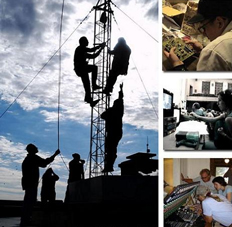
Community Radio Reaches Out in Haiti
[Source: Prometheus Radio Project, January 27, 2010]
 "Much
has been made about the role flashier technologies like Twitter, Skype
and text messaging have played in helping disaster victims find loved
ones and communicate with international aid workers," notes a recent CNN report on Haiti.
"But it is worth noting that, when all else fails, the low-tech hum of
a radio frequency is sometimes the only line of communication that's
open.
"Much
has been made about the role flashier technologies like Twitter, Skype
and text messaging have played in helping disaster victims find loved
ones and communicate with international aid workers," notes a recent CNN report on Haiti.
"But it is worth noting that, when all else fails, the low-tech hum of
a radio frequency is sometimes the only line of communication that's
open.
Radio has played a major role in the response to the January 12 earthquake in Haiti, a role that has been noted both by recovery aid organizations and news outlets, including the Washington Post and The New York Times.
According
to international community radio association AMARC, community radio has
developed as an essential part of Haiti's communications landscape
since 1992. AMARC reports
that at least 16 community radio stations were damaged or destroyed in
the quake, and the organization has sent a team to investigate the
welfare of their 35 member stations. Internews, an international media development organization that works with 40 community radio stations in Haiti, has provided technical support, equipment, and informational programming since the earthquake.
The
US government is also relying on radio to reach Haitians; the
government has distributed tens of thousands of solar-powered and
hand-cranked radios, and has been broadcasting on FM and AM frequencies from an Air Force plane .
And Haitian stations themselves have quickly gone back on the air, running on small diesel generators, sometimes broadcasting in the streets to escape dangerously damaged buildings.
Small, locally-run radio stations are the fastest way to regain communications in a crisis that has shut down electricity and cell phone towers. Prometheus has reported on this when Hurricane Katrina hit the Gulf, and low power radio was the only source of emergency information in a number of counties and in the Astrodome.
In the US, friends and family are reaching out to loved ones in Haiti and seeking information through Haitian radio stations in New York, Boston, Tampa, and other cities with large Haitian populations. Most famous is Brooklyn's Radio Soleil d'Haiti, which has linked to Haiti's Signal FM to share information with families.
Many Haitian stations in the US are unlicensed, operate only online, or operate via special subcarrier transmission, a technology which requires the purchase of a special receiver. The number of unlicensed stations in the US highlights the demand for new low power radio license opportunities to meet the information needs of growing immigrant communities.
Low power radio has proven to be a lifeline again and again in times of emergency, and we have worked to share this information with lawmakers to expand LPFM in Congress. In Haiti and in the US, communication is a human right: it should inexpensive, locally relevant, and available to all.


